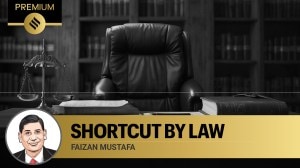Excise policy: Delhi court allows Aurobindo Pharma director to turn approver in case
Reddy, a director at Aurobindo Pharma, was arrested by the Enforcement Directorate (ED) on November 10 last year, along with others, and accused of being instrumental in the alleged cartelisation of licences as well as in moving kickbacks in the entire liquor licensing process.
 The ED is investigating alleged money laundering in the now-scrapped liquor policy. Archive
The ED is investigating alleged money laundering in the now-scrapped liquor policy. Archive A Delhi court has allowed Hyderabad-based businessman P Sarath Chandra Reddy, an accused in a money laundering probe related to the now-scrapped excise policy case, to turn approver. Special Judge MK Nagpal granted pardon to Reddy on an application moved by him.
Reddy, a director at Aurobindo Pharma, was arrested by the Enforcement Directorate (ED) on November 10 last year, along with others, and accused of being instrumental in the alleged cartelisation of licences as well as in moving kickbacks in the entire liquor licensing process.
“I am ready to make true disclosure voluntarily about the case and want to be an approver in the case,” Reddy, who was
recently granted bail by the Delhi High Court on medical grounds, had stated in his application. Delhi-based businessman Dinesh Arora had earlier turned approver in the case being probed by the CBI.
According to the ED, Reddy is head of Hyderabad-based Aurobindo Pharma and was also engaged in the liquor business. The agency had earlier told the court that it was amply evident that Reddy had allegedly actively planned and conspired with various business owners and politicians involved in the case, and indulged in unfair market practices to gain undue advantage from the excise policy.
According to the ED’s prosecution complaint, AAP communication in-charge Vijay Nair, acting on behalf of the party’s leaders, “received kickbacks to the tune of Rs 100 crore from a group, for convenience, we may call it the South Group (as termed in the statements of various persons recorded during the investigation)”. Reddy is alleged to be part of this collective.
The ED claimed these kickbacks were “paid in advance to AAP leaders through Nair by South Group as a part of an agreement between South Group and AAP leaders” so it could secure “uninhibited access, undue favours, attained stakes in established wholesale businesses and multiple retail zones (over and above what was allowed in the policy)”.







